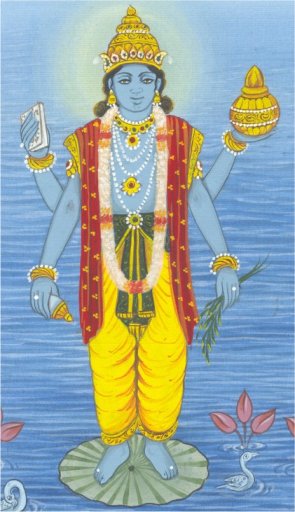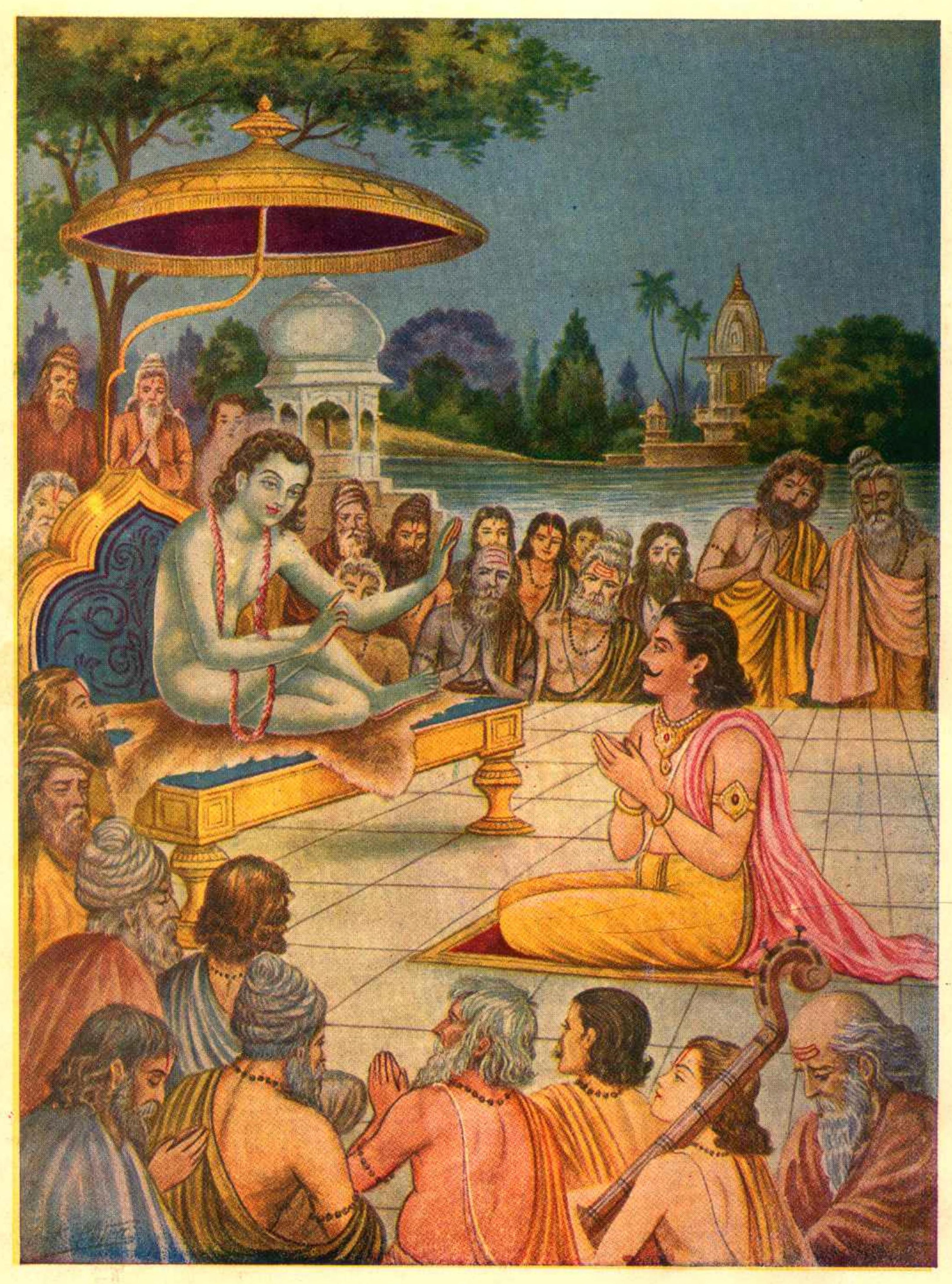|
Dhanvantari
Dhanvantari () is the physician of the devas in Hinduism. He is regarded as an avatar of Vishnu. He is mentioned in the Puranas as the god of Ayurveda. During his incarnation on earth, he reigned as the King of Kashi, today locally referred to as Varanasi. Dhanvantari is also identified as the great-grandfather of Divodasa, the King of Kashi mentioned in the Vishnu Purana who is known as the father of surgery in Ayurveda. Iconography According to the ancient Sanskrit work ''Vishnudharamottara'', Dhanvantari is a handsome individual and is to usually be depicted with four hands, with one or two of them carrying a bowl of amrita, the elixir of immortality. Dhanvantari is depicted in a stark resemblance to Vishnu, with four hands, holding the shankha, chakra, jalauka (herb), and a pot containing amrita. He is often shown with a leech in his hand rather than the scriptures, symbolism for the historical practice of bloodletting. Some texts describe him as holding a conch, amr ... [...More Info...] [...Related Items...] OR: [Wikipedia] [Google] [Baidu] |
Dhanteras
Dhanatrayodashi (), also known as Dhanteras (), is the first day that marks the festival of Diwali or Tihar in most of India and Nepal It is celebrated on the thirteenth lunar day (Trayodashi) of Krishna Paksha (dark fortnight) in the Hindu calendar month of Ashwin (according to the amānta tradition) or Kartika (according to the Bikram Sambat tradition). Dhanvantari, who is also worshipped on the occasion of Dhanteras, is considered the god of Ayurveda who imparted the wisdom of Ayurveda for the betterment of mankind and to help rid it of the suffering of disease. The Indian ministry of Ayurveda, Yoga and Naturopathy, Unani, Siddha and Homeopathy announced its decision to observe Dhanteras as the "National Ayurveda Day", which was first observed on 28 October 2016. Celebrations Dhanteras is the worship of Dhanvantari. Dhanvantari, according to Hindu traditions, emerged during Samudra Manthana, holding a pot full of '' amrita'' (a nectar bestowing immortality) in on ... [...More Info...] [...Related Items...] OR: [Wikipedia] [Google] [Baidu] |
Ayurveda
Ayurveda (; ) is an alternative medicine system with historical roots in the Indian subcontinent. It is heavily practised throughout India and Nepal, where as much as 80% of the population report using ayurveda. The theory and practice of ayurveda is pseudoscientific and toxic metals including lead and Mercury (element), mercury are used as ingredients in many ayurvedic medicines. Ayurveda therapies have varied and evolved over more than two millennia. Therapies include herbal medicines, Dieting#Detox, special diets, Meditation#Hinduism, meditation, yoga, massage, Laxative#Historical and health fraud uses, laxatives, Enema#Alternative medicine, enemas, and medical oils. Ayurvedic preparations are typically based on complex herbal compounds, minerals, and metal substances (perhaps under the influence of early Indian alchemy or ''rasashastra''). Ancient ayurveda texts also taught surgical techniques, including rhinoplasty, lithotomy, sutures, cataract surgery, and the extraction ... [...More Info...] [...Related Items...] OR: [Wikipedia] [Google] [Baidu] |
Vishnu
Vishnu (; , , ), also known as Narayana and Hari, is one of the Hindu deities, principal deities of Hinduism. He is the supreme being within Vaishnavism, one of the major traditions within contemporary Hinduism, and the god of preservation (sattva). Vishnu is known as ''The Preserver'' within the Trimurti, the triple deity of Para Brahman, supreme divinity that includes Brahma and Shiva.Gavin Flood, An Introduction to Hinduism' () (1996), p. 17. In Vaishnavism, Vishnu is the supreme Lord who creates, protects, and transforms the Hindu cosmology, universe. Tridevi is stated to be the energy and creative power (Shakti) of each, with Lakshmi being the equal complementary partner of Vishnu. He is one of the five equivalent deities in Panchayatana puja of the Smarta tradition of Hinduism. According to Vaishnavism, the supreme being is with qualities (Saguna Brahman, Saguna), and has definite form, but is limitless, transcendent and unchanging absolute Brahman, and the primal Atma ... [...More Info...] [...Related Items...] OR: [Wikipedia] [Google] [Baidu] |
Samudra Manthan
The Samudra Manthana () is a major episode in Hinduism that is elaborated in the Vishnu Purana, a major text of Hinduism. The Samudra Manthana explains the origin of the elixir of eternal life, amrita. Nomenclature *Sāgara manthana (सागरमन्थन) – ''Sāgara'' is another word for '' Samudra'', both meaning a sea or large water body. *Kshirasāgara manthana (क्षीरसागरमन्थन) – ''Kshirasāgara'' means the ocean of milk or milky ocean. ''Kshirasāgara'' = ''Kshira'' (milk) + ''Sāgara'' (ocean or sea). *Amrita Manthana (अमृतमन्थन) – ''Amrita'' means the elixir. “''Churning for the Elixir”'' Legend Indra, the King of Svarga, was riding on his divine elephant when he came across the sage Durvasa, who offered him a special garland given to him by an apsara. The deity accepted the garland and placed it on the trunk (sometime the tusks or the head of the elephant in some scriptures) of Airavata (his mount) as a tes ... [...More Info...] [...Related Items...] OR: [Wikipedia] [Google] [Baidu] |
Divodasa
Divodāsa Vādhryāśva, was an Indo-Aryan, king of the Bharatas during the main or middle Rigvedic period (celebrated for his liberality and protected by Indra and the Ashvins in the Rigveda, RV 1.112.14; 1.116.18), the son of Vadhryaśva RV 6.61.5. Further, the Mandala 9 of Rigveda mentions Divodasa thus: " ndraSmote swiftly forts, and Sambara, then Yadu and that Turvasha, for pious Divodasa's sake." RV 9.61.2. Another telling of the same conflict with Sambara from Mandala 4 names him with the epithet of ''Atithigva'', as shown: "I ndra in my exhilaration, broke apart all at once the nine and ninety fortresses of Śambara, and the hundredth, his dwelling place, to complete it, when I helped Divodāsa Atithigva." RV 4.26.3. He is the father of the famous king Sudas (RV 7.18.25) (of the Battle of the Ten Kings). Pijavana is the other name of Divodasa according to Rigveda. His son, Pratardana, is mentioned in the Kaushitaki Upanishad. He was invited in the Ashwamedh ... [...More Info...] [...Related Items...] OR: [Wikipedia] [Google] [Baidu] |
Varanasi
Varanasi (, also Benares, Banaras ) or Kashi, is a city on the Ganges river in northern India that has a central place in the traditions of pilgrimage, death, and mourning in the Hindu world.* * * * The city has a syncretic tradition of Islamic artisanship that underpins its religious tourism.* * * * * Located in the middle-Ganges valley in the southeastern part of the state of Uttar Pradesh, Varanasi lies on the left bank of the river. It is to the southeast of India's capital New Delhi and to the southeast of the state capital, Lucknow. It lies downstream of Prayagraj, where the confluence with the Yamuna river is another major Hindu pilgrimage site. Varanasi is one of the world's oldest continually inhabited cities. Kashi, its ancient name, was associated with a kingdom of the same name of 2,500 years ago. The Lion capital of Ashoka at nearby Sarnath has been interpreted to be a commemoration of the Buddha's first sermon there in the fifth century BCE. In the ... [...More Info...] [...Related Items...] OR: [Wikipedia] [Google] [Baidu] |
Ocean Of Milk
In Hindu cosmology, the ''Kshira Sagara'' (, ; ; ; Telugu: Pala Samudram) or Ocean of Milk is the fifth from the centre of the seven oceans. It surrounds the continent known as Krauncha. According to Hindu scriptures, the devas and asuras worked together for a millennium to churn this ocean in order to acquire amrita, the nectar of immortality. The episode is mentioned in the ''Samudra Manthana'' chapter of the Puranas, a body of ancient Hindu legends. The Kshira Sagara is described as the place where the deity Vishnu reclines over his serpent-mount Shesha, accompanied by his consort, Lakshmi. Etymology The "Ocean of Milk" is the English translation of the Sanskrit terms ', ' or ', from '' kṣīra'' "milk" and ', ' "water, ocean" or ' "ocean." The term varies across Indic languages, referred to as ''Khir Shaagor'' in Bengali, ''Tiruppāṟkaṭal'' in Tamil, and ''Pāla Samudram'' in Telugu. The Churning of the Ocean The Kshira Sagara is the site of the legend of the Sam ... [...More Info...] [...Related Items...] OR: [Wikipedia] [Google] [Baidu] |
Deva (Hinduism)
''Deva'' (, ) means 'shiny', 'exalted', 'heavenly being', 'divine being', 'anything of excellence', and is also one of the Sanskrit terms used to indicate a deity in Hinduism.Monier Monier-Williams, A Sanskrit-English Dictionary” Etymologically and Philologically Arranged to cognate Indo-European Languages, Motilal Banarsidass, page 492 ''Deva'' is a masculine term; the feminine equivalent is ''Devi (Hinduism), Devi''. The word is a cognate with Latin ''deus'' ('god') and Greek Zeus. In the earliest Vedic literature, all supernatural beings are called ''Devas''George Williams (2008), A Handbook of Hindu Mythology, Oxford University Press, , pages 90, 112 and ''Asuras''. The concepts and legends evolved in Indian literature#In archaic Indian languages, ancient Indian literature, and by the late Vedic period, benevolent supernatural beings are referred to as ''Deva-Asuras''. In post-Vedic Hindu texts, such as the Puranas and the Itihasas of Hinduism, the ''Devas'' represent the g ... [...More Info...] [...Related Items...] OR: [Wikipedia] [Google] [Baidu] |
Siddhar
The Siddhar (Tamil language, Tamil (romanized) ''cittar)'' in Tamils, Tamil tradition is a perfected individual who has attained spiritual powers called ''siddhi''. Historically, Siddhar also refers to the people who were early-age wandering adepts that dominated ancient Tamil teaching and philosophy. They were knowledgeable in science, technology, astronomy, literature, fine arts, music, drama, and dance and provided solutions to common people's illnesses and advice for their future. Some of their ideologies are considered to have originated during the First Sangam period. Practice Siddhars were typically scientists, saints, doctors, alchemists, and mystics all in one. They wrote their findings in the form of Tamil poems on Palm-leaf manuscript, palm leaf manuscripts. They typically believe in Monotheism, one god, but there are some Siddhars who believe in polytheism. These are still owned by some families in Tamil Nadu and handed down through the generations, as well as bei ... [...More Info...] [...Related Items...] OR: [Wikipedia] [Google] [Baidu] |
Amrita
''Amrita'' (, IAST: ''amṛta''), ''Amrit'' or ''Amata'' in Pali language, Pali, (also called ''Sudha'', ''Amiy'', ''Ami'') is a Sanskrit word that means "immortality". It is a central concept within Indian religions and is often referred to in ancient Indian texts as an Elixir of life, elixir. Its first occurrence is in the Rigveda, where it is considered one of several synonyms for ''soma (drink), soma'', the drink of the Deva (Hinduism), devas. Amrita plays a significant role in the Samudra manthan, Samudra Manthana, and is the cause of the conflict between devas and asuras competing for amrita to obtain immortality. Amrita has varying significance in different Indian religions. The word ''Amrit'' is also a common first name for Sikhs and Hindus, while its feminine form is ''Amritā''. Amrita is cognate to and shares many similarities with ambrosia; both originated from a common Proto-Indo-European mythology, Proto-Indo-European source."Ambrosia" in ''Chambers's Encyclopædi ... [...More Info...] [...Related Items...] OR: [Wikipedia] [Google] [Baidu] |
Bhagavata Purana
The ''Bhagavata Purana'' (; ), also known as the ''Srimad Bhagavatam (Śrīmad Bhāgavatam)'', ''Srimad Bhagavata Mahapurana'' () or simply ''Bhagavata (Bhāgavata)'', is one of Hinduism's eighteen major Puranas (''Mahapuranas'') and one of the most popular in Vaishnavism. Composed in Sanskrit and traditionally attributed to Veda Vyasa, it promotes '' bhakti'' (devotion) towards Krishna, an avatar of Vishnu, integrating themes from the Advaita (monism) philosophy of Adi Shankara, the Vishishtadvaita (qualified monism) of Ramanujacharya and the Dvaita (dualism) of Madhvacharya. It is widely available in almost all Indian languages. The ''Bhagavata Purana'', like other puranas, discusses a wide range of topics including cosmology, astronomy, genealogy, geography, legend, music, dance, yoga and culture. As it begins, the forces of evil have won a war between the benevolent '' devas'' (deities) and evil '' asuras'' (demons) and now rule the universe. Truth re-emerges as ... [...More Info...] [...Related Items...] OR: [Wikipedia] [Google] [Baidu] |








